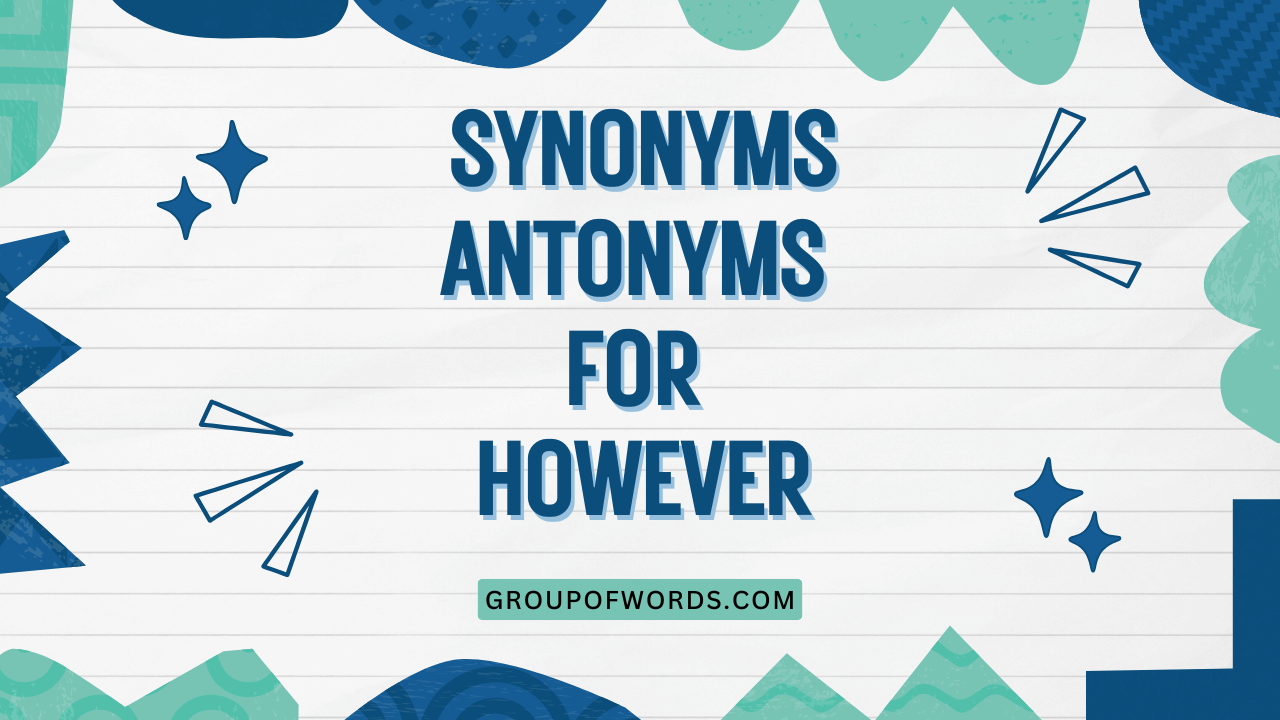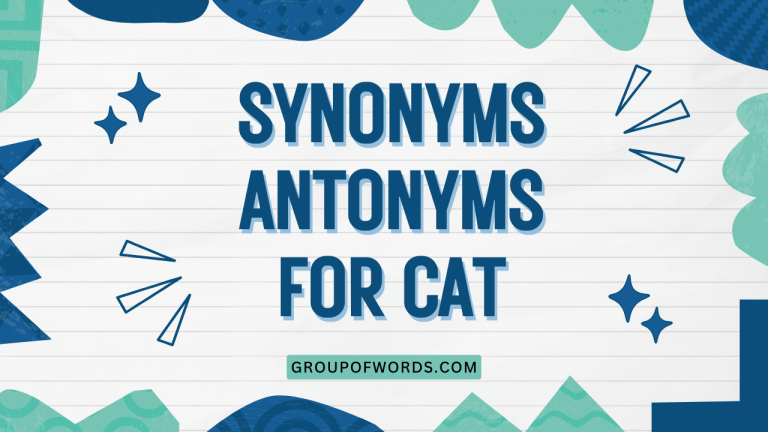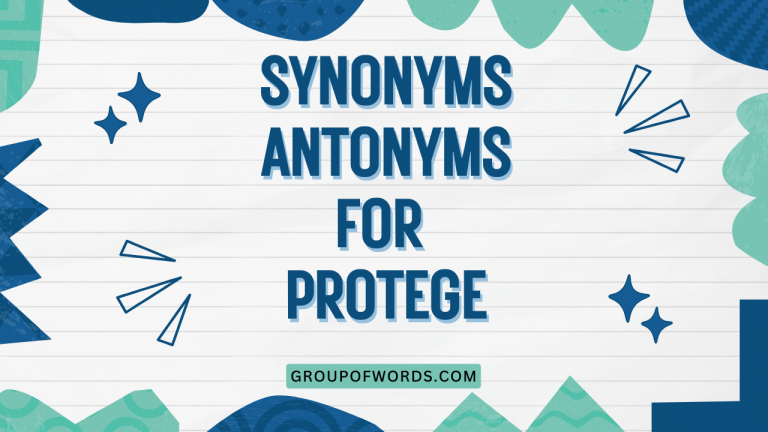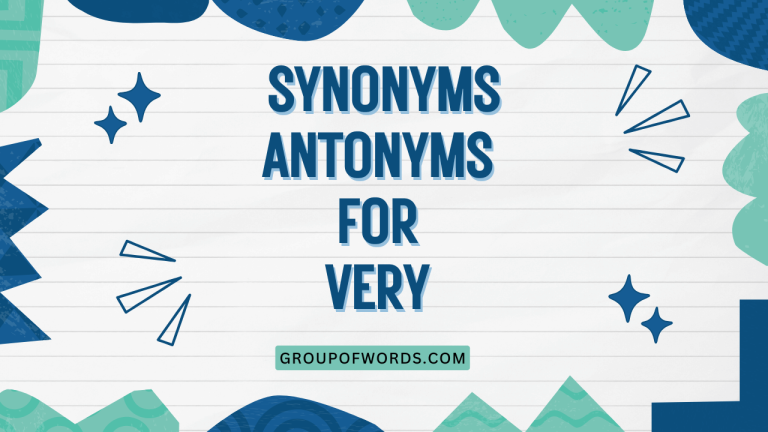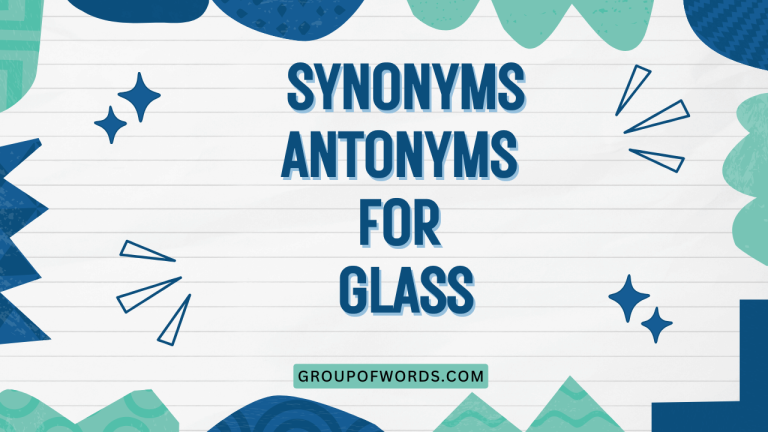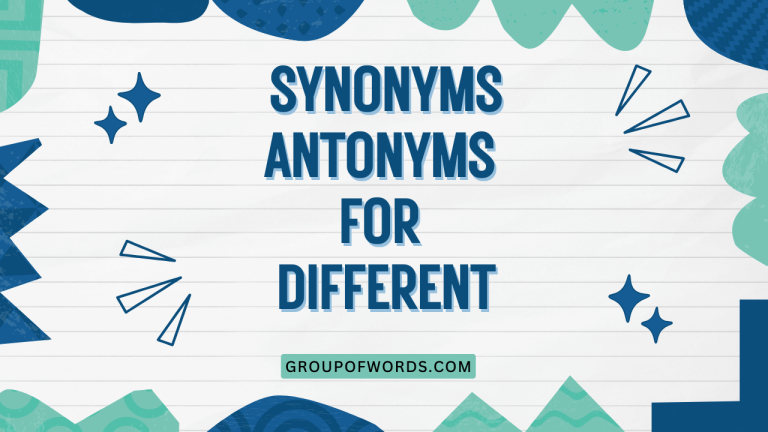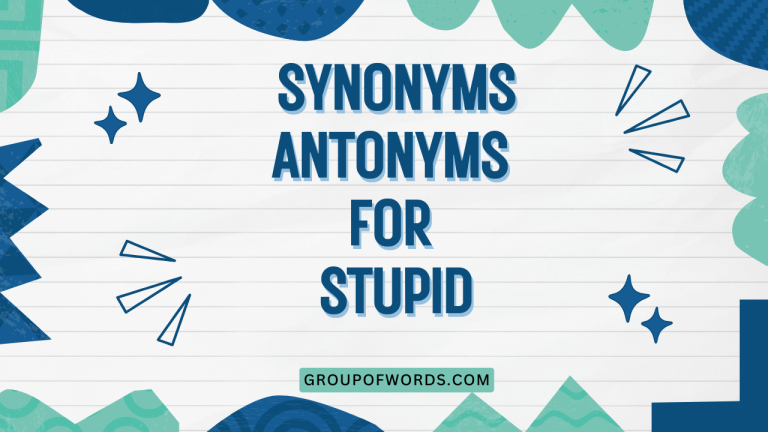Synonyms and Antonyms for “However”: A Comprehensive Guide
Understanding how to use synonyms and antonyms for the word “however” is crucial for enhancing the clarity, flow, and sophistication of your writing. “However” is a transitional word that signals contrast, concession, or a shift in thought.
By mastering its alternatives, you can avoid repetitive language and express nuances more effectively. This article provides a comprehensive guide to synonyms and antonyms for “however,” complete with definitions, examples, usage rules, common mistakes, practice exercises, and advanced topics.
This guide is beneficial for English language learners, writers, students, and anyone looking to improve their communication skills.
This article will cover everything you need to know to master the use of synonyms and antonyms for “however,” ensuring you can write with greater precision and variety.
Table of Contents
- Introduction
- Definition of “However”
- Structural Breakdown
- Synonyms for “However”
- Antonyms for “However”
- Examples
- Usage Rules
- Common Mistakes
- Practice Exercises
- Advanced Topics
- FAQ
- Conclusion
Definition of “However”
“However” is an adverb and a conjunctive adverb (also known as an adverbial conjunction) that serves primarily to introduce a statement that contrasts with or qualifies a previous statement. It indicates a change in direction, a contradiction, or a limitation to what has already been said.
Its function is to create a logical connection between two clauses or sentences, signaling to the reader that a shift in thought is about to occur.
In simpler terms, “however” is used to say something that is different from or contrasts with something you have just said. It can also be used to add a qualification or exception to a previous statement.
Structural Breakdown
Structurally, “however” can be used in several ways within a sentence:
- At the beginning of a sentence: When used at the beginning of a sentence, “however” is typically followed by a comma. This is the most common placement.
- In the middle of a sentence: When used in the middle of a sentence, “however” is usually set off by commas. This placement emphasizes the contrasting element.
- At the end of a sentence: While less common, “however” can also appear at the end of a sentence, though this usage is often considered less formal.
The placement of “however” affects the emphasis and flow of the sentence. Beginning a sentence with “however” creates a strong contrast, while embedding it in the middle offers a more subtle shift.
The choice depends on the desired effect and the overall tone of the writing.
Synonyms for “However”
Many words and phrases can substitute for “however,” each with slightly different nuances. These synonyms can be broadly categorized into those expressing contrast, concession, and alternative.
Synonyms Expressing Contrast
These synonyms highlight a direct opposition or difference between two statements. They are used to show that the second statement is in contrast to the first.
- But: A simple and direct way to express contrast.
- Nevertheless: Indicates that despite the preceding statement, the following statement is still true.
- Nonetheless: Similar to “nevertheless,” emphasizing that something is true despite what has been said.
- Yet: Suggests a contrast that is somewhat surprising or unexpected.
- Still: Implies that something remains true despite a conflicting factor.
- Conversely: Indicates that the following statement is the opposite of the preceding one.
- In contrast: Directly points out the difference between two things.
- On the other hand: Introduces an alternative viewpoint or consideration.
- Whereas: Used to show a direct contrast between two facts or situations.
- While: Similar to “whereas,” emphasizing a simultaneous contrast.
Synonyms Expressing Concession
These synonyms acknowledge a point but then introduce a contrasting or limiting factor. They admit something before presenting a different perspective.
- Although: Introduces a subordinate clause that contrasts with the main clause.
- Though: Similar to “although,” but often used more informally.
- Even though: Emphasizes the contrast despite the preceding statement.
- Despite: Indicates that something is true despite an obstacle or difficulty.
- In spite of: Similar to “despite,” showing that something happens regardless of a hindrance.
Synonyms Expressing Alternative
These synonyms present a different option or possibility. They introduce a new perspective or course of action.
- Instead: Indicates that one thing is done or chosen in place of another.
- Alternatively: Offers a different possibility or approach.
Antonyms for “However”
Antonyms for “however” express agreement, addition, or continuation rather than contrast. These words and phrases indicate that the following statement supports or extends the previous one.
Antonyms Expressing Agreement or Addition
- Moreover: Adds further information to support the previous statement.
- Furthermore: Similar to “moreover,” indicating an additional point.
- In addition: Introduces a new element that supports or complements the previous one.
- Besides: Adds another reason or point to the argument.
- Also: Simply adds another piece of information.
- Likewise: Indicates that the following statement is similar to the previous one.
- Similarly: Similar to “likewise,” showing a parallel or resemblance.
- Indeed: Emphasizes the truth or validity of the previous statement.
- Therefore: Indicates a logical consequence or conclusion.
- Thus: Similar to “therefore,” showing a result or outcome.
- Consequently: Indicates that the following statement is a result of the previous one.
- Accordingly: Shows that the following action or statement is in agreement with the previous one.
Examples
The following tables provide examples of how to use synonyms and antonyms for “however” in sentences. Each table focuses on a different category of synonyms or antonyms, illustrating their specific usage and meaning.
Examples with Contrast Synonyms
This table demonstrates the use of synonyms that express contrast. Note how each synonym subtly changes the emphasis or tone of the sentence.
| Original Sentence | Synonym | Revised Sentence |
|---|---|---|
| I wanted to go to the beach; however, it started raining. | But | I wanted to go to the beach, but it started raining. |
| The team played poorly; however, they still won the game. | Nevertheless | The team played poorly; nevertheless, they still won the game. |
| He was tired; however, he continued working. | Nonetheless | He was tired; nonetheless, he continued working. |
| She studied hard; however, she failed the exam. | Yet | She studied hard, yet she failed the exam. |
| The car was old; however, it still ran well. | Still | The car was old, but it still ran well. |
| He likes coffee; however, I prefer tea. | Conversely | He likes coffee; conversely, I prefer tea. |
| The first half was boring; however, the second half was exciting. | In contrast | The first half was boring; in contrast, the second half was exciting. |
| I enjoy hiking; however, my friend prefers biking. | On the other hand | I enjoy hiking; on the other hand, my friend prefers biking. |
| Some people like summer; however, others prefer winter. | Whereas | Some people like summer, whereas others prefer winter. |
| The city is crowded; however, the countryside is peaceful. | While | The city is crowded, while the countryside is peaceful. |
| The food was delicious; however, the service was slow. | But | The food was delicious, but the service was slow. |
| She is very talented; however, she lacks confidence. | Nevertheless | She is very talented; nevertheless, she lacks confidence. |
| The project was challenging; however, we completed it successfully. | Nonetheless | The project was challenging; nonetheless, we completed it successfully. |
| He apologized; however, she was still angry. | Yet | He apologized, yet she was still angry. |
| The computer is old; however, it still works perfectly. | Still | The computer is old, but it still works perfectly. |
| Cats are independent; however, dogs are more loyal. | Conversely | Cats are independent; conversely, dogs are more loyal. |
| The price is high; however, the quality is excellent. | In contrast | The price is high; in contrast, the quality is excellent. |
| I love to travel; however, my spouse prefers to stay home. | On the other hand | I love to travel; on the other hand, my spouse prefers to stay home. |
| Some students prefer online classes; however, others prefer in-person. | Whereas | Some students prefer online classes, whereas others prefer in-person. |
| The days are long; however, the years are short. | While | The days are long, while the years are short. |
| The movie was long; however, it was very enjoyable. | But | The movie was long, but it was very enjoyable. |
| He was injured; however, he continued to play. | Nevertheless | He was injured; nevertheless, he continued to play. |
| The task was difficult; however, they persisted. | Nonetheless | The task was difficult; nonetheless, they persisted. |
| She practiced daily; however, she didn’t win. | Yet | She practiced daily, yet she didn’t win. |
| The room was small; however, it felt cozy. | Still | The room was small, but it still felt cozy. |
Examples with Concession Synonyms
This table illustrates the use of synonyms that express concession. These synonyms acknowledge a point before introducing a contrasting element.
| Original Sentence | Synonym | Revised Sentence |
|---|---|---|
| However tired I was, I finished the project. | Although | Although I was tired, I finished the project. |
| However difficult it seemed, she never gave up. | Though | Though it seemed difficult, she never gave up. |
| However much it cost, they decided to buy it. | Even though | Even though it cost a lot, they decided to buy it. |
| However hard it rained, they continued the hike. | Despite | Despite the hard rain, they continued the hike. |
| However many obstacles they faced, they succeeded. | In spite of | In spite of the many obstacles they faced, they succeeded. |
| However late it was, she called him. | Although | Although it was late, she called him. |
| However much he denied it, she knew the truth. | Though | Though he denied it, she knew the truth. |
| However much she hated it, she still went to the party. | Even though | Even though she hated it, she still went to the party. |
| However much it hurt, he kept running. | Despite | Despite the pain, he kept running. |
| However much she cried, she didn’t change his mind. | In spite of | In spite of her tears, she didn’t change his mind. |
| However cold it was, they went swimming. | Although | Although it was cold, they went swimming. |
| However shy she was, she gave the presentation. | Though | Though she was shy, she gave the presentation. |
| However busy he was, he made time for her. | Even though | Even though he was busy, he made time for her. |
| However poor he was, he was always generous. | Despite | Despite his poverty, he was always generous. |
| However inexperienced she was, she did a great job. | In spite of | In spite of her inexperience, she did a great job. |
| However scared I was, I faced my fears. | Although | Although I was scared, I faced my fears. |
| However hard I tried, I couldn’t solve the puzzle. | Though | Though I tried hard, I couldn’t solve the puzzle. |
| However much I disagreed, I respected his opinion. | Even though | Even though I disagreed, I respected his opinion. |
| However much I disliked the food, I ate it politely. | Despite | Despite disliking the food, I ate it politely. |
| However tired I felt, I finished my work. | In spite of | In spite of feeling tired, I finished my work. |
Examples with Alternative Synonyms
This table shows the use of synonyms that express an alternative. These synonyms introduce a different option or possibility.
| Original Sentence | Synonym | Revised Sentence |
|---|---|---|
| We could go to the movies; however, we could stay home and watch TV. | Instead | We could go to the movies; instead, we could stay home and watch TV. |
| You can take the bus; however, you can drive your car. | Alternatively | You can take the bus; alternatively, you can drive your car. |
| They can eat pizza; however, they could order burgers. | Instead | They can eat pizza; instead, they could order burgers. |
| We can walk; however, we can take a taxi. | Alternatively | We can walk; alternatively, we can take a taxi. |
| I can study math; however, I can study science. | Instead | I can study math; instead, I can study science. |
| You can buy it new; however, you could find it used. | Alternatively | You can buy it new; alternatively, you could find it used. |
| We can go out to eat; however, we could cook at home. | Instead | We can go out to eat; instead, we could cook at home. |
| You can pay with cash; however, you can use a credit card. | Alternatively | You can pay with cash; alternatively, you can use a credit card. |
| They can travel by plane; however, they could drive. | Instead | They can travel by plane; instead, they could drive. |
| We can meet on Monday; however, we can meet on Tuesday. | Alternatively | We can meet on Monday; alternatively, we can meet on Tuesday. |
Examples with Antonyms
This table demonstrates the use of antonyms that express agreement or addition rather than contrast.
| Original Sentence | Antonym | Revised Sentence |
|---|---|---|
| He is smart; however, he is also kind. | Moreover | He is smart; moreover, he is also kind. |
| She is talented; however, she is dedicated. | Furthermore | She is talented; furthermore, she is dedicated. |
| The book is interesting; however, it is informative. | In addition | The book is interesting; in addition, it is informative. |
| He is rich; however, he is generous. | Besides | He is rich; besides, he is generous. |
| She is beautiful; however, she is intelligent. | Also | She is beautiful; also, she is intelligent. |
| The weather is warm; however, the sky is clear. | Likewise | The weather is warm; likewise, the sky is clear. |
| The coffee is strong; however, the tea is flavorful. | Similarly | The coffee is strong; similarly, the tea is flavorful. |
| He is honest; however, he is trustworthy. | Indeed | He is honest; indeed, he is trustworthy. |
| The evidence is clear; however, the verdict is guilty. | Therefore | The evidence is clear; therefore, the verdict is guilty. |
| The work is done; however, we can relax. | Thus | The work is done; thus, we can relax. |
| He studied hard; however, he passed the exam. | Consequently | He studied hard; consequently, he passed the exam. |
| The rules were followed; however, the game proceeded smoothly. | Accordingly | The rules were followed; accordingly, the game proceeded smoothly. |
| She practices piano daily; however, she is becoming very skilled. | Therefore | She practices piano daily; therefore, she is becoming very skilled. |
| He volunteered his time; however, he made a positive impact. | Consequently | He volunteered his time; consequently, he made a positive impact. |
| The team trained hard; however, they won the championship. | Thus | The team trained hard; thus, they won the championship. |
Usage Rules
When using synonyms for “however,” it’s important to follow certain usage rules to ensure clarity and grammatical correctness:
- Punctuation: Most synonyms for “however” require a comma before them when they connect two independent clauses. If the synonym is used to start a new sentence, it should be followed by a comma.
- Context: Choose the synonym that best fits the context and conveys the intended nuance. “But” is more direct than “nevertheless,” which implies a stronger contrast despite a preceding fact.
- Formal vs. Informal: Some synonyms are more appropriate for formal writing (“nevertheless,” “conversely”), while others are better suited for informal contexts (“but,” “still”).
- Placement: Pay attention to the placement of the synonym within the sentence. Moving “however” or its synonyms can change the emphasis.
Understanding these rules will help you use synonyms for “however” effectively and avoid common errors.
Common Mistakes
Here are some common mistakes to avoid when using synonyms and antonyms for “however”:
| Incorrect | Correct | Explanation |
|---|---|---|
| I was tired however, I continued working. | I was tired; however, I continued working. | Missing comma before “however” when connecting two independent clauses. |
| Although, I was tired, I continued working. | Although I was tired, I continued working. | “Although” should not be followed by a comma when it introduces a subordinate clause. |
| He is smart, but however, he is lazy. | He is smart; however, he is lazy. OR He is smart, but he is lazy. | Using “but” and “however” together is redundant. |
| She is rich, also, she is generous. | She is rich; also, she is generous. OR She is rich, and she is generous. | “Also” needs to be properly connected, or use “and” to join the clauses. |
| Despite of the rain, we went out. | Despite the rain, we went out. | “Despite” should not be followed by “of.” |
| He is intelligent nevertheless, he fails sometimes. | He is intelligent; nevertheless, he fails sometimes. | Missing comma before “nevertheless” when connecting two independent clauses. |
| The food was delicious in contrast, the service was terrible. | The food was delicious; in contrast, the service was terrible. | Missing comma before “in contrast” when connecting two independent clauses. |
| The movie was long but however, it was enjoyable. | The movie was long; however, it was enjoyable. OR The movie was long, but it was enjoyable. | Using “but” and “however” together is redundant. |
| She is kind furthermore, she is generous. | She is kind; furthermore, she is generous. | Missing comma before “furthermore” when connecting two independent clauses. |
| He studied hard therefore, he passed the exam. | He studied hard; therefore, he passed the exam. | Missing comma before “therefore” when connecting two independent clauses. |
Practice Exercises
Test your understanding of synonyms and antonyms for “however” with these practice exercises.
Exercise 1: Choosing the Right Synonym
Choose the best synonym for “however” in each sentence.
| Question | Options | Answer |
|---|---|---|
| The weather was cold; ____, we went swimming. | A) but B) although C) moreover D) therefore | B) although |
| She studied hard; ____, she failed the exam. | A) therefore B) but C) in addition D) likewise | B) but |
| He is rich; ____, he is generous. | A) however B) moreover C) but D) although | B) moreover |
| We could go to the movies; ____, we could stay home. | A) but B) instead C) therefore D) also | B) instead |
| The food was delicious; ____, the service was slow. | A) also B) therefore C) however D) in addition | C) however |
| He was tired; ____, he finished the race. | A) therefore B) although C) moreover D) but | B) although |
| She is talented; ____, she lacks confidence. | A) but B) therefore C) in addition D) likewise | A) but |
| The book is interesting; ____, it is informative. | A) however B) moreover C) but D) although | B) moreover |
| You can take the bus; ____, you can drive your car. | A) but B) instead C) therefore D) also | B) instead |
| The movie was long; ____, it was enjoyable. | A) also B) therefore C) however D) in addition | C) however |
Exercise 2: Replacing “However” in Sentences
Rewrite the following sentences, replacing “however” with a suitable synonym or antonym.
| Question | Answer |
|---|---|
| I wanted to go to the party; however, I was too tired. | I wanted to go to the party, but I was too tired. |
| She is very intelligent; however, she is also very modest. | She is very intelligent; moreover, she is also very modest. |
| He tried his best; however, he didn’t succeed. | He tried his best, but he didn’t succeed. |
| We could eat pizza; however, we could order sushi. | We could eat pizza; instead, we could order sushi. |
| The weather was bad; however, we still had a great time. | Although the weather was bad, we still had a great time. |
| I studied for hours; however, I still felt unprepared. | I studied for hours, yet I still felt unprepared. |
| She is kind; however, she is also very patient. | She is kind; furthermore, she is also very patient. |
| We can walk to the store; however, we can take the bus. | We can walk to the store; alternatively, we can take the bus. |
| The movie was long; however, it was very entertaining. | The movie was long, but it was very entertaining. |
| He is rich; however, he is unhappy. | He is rich; however, he is unhappy. |
Exercise 3: Using Antonyms to Show Agreement
Rewrite the following sentences to use antonyms of “however” to show agreement or addition.
| Question | Answer |
|---|---|
| She is smart; however, she is also hardworking. | She is smart; moreover, she is also hardworking. |
| He is kind; however, he is also generous. | He is kind; furthermore, he is also generous. |
| The book is interesting; however, it is also informative. | The book is interesting; in addition, it is also informative. |
| The weather is warm; however, the sky is clear. | The weather is warm; likewise, the sky is clear. |
| She is talented; however, she is dedicated. | She is talented; besides, she is dedicated. |
| He is intelligent; however, he is also creative. | He is intelligent; indeed, he is also creative. |
| She is honest; however, she is trustworthy. | She is honest; therefore, she is trustworthy. |
| He studied hard; however, he passed the exam. | He studied hard; consequently, he passed the exam. |
| The rules were followed; however, the game proceeded smoothly. | The rules were followed; accordingly, the game proceeded smoothly. |
| She is beautiful; however, she is also intelligent. | She is beautiful; also, she is intelligent. |
Advanced Topics
For advanced learners, understanding the nuances of formal vs. informal usage and the subtle differences in meaning among synonyms is crucial.
Formal vs. Informal Usage
In formal writing, synonyms like “nevertheless,” “nonetheless,” “conversely,” and “in contrast” are preferred for their precision and sophistication. In informal writing, “but,” “still,” and “yet” are more common and acceptable.
The choice depends on the intended audience and the overall tone of the writing.
Consider the following example:
- Formal: The data suggests a decline in sales; nevertheless, we remain optimistic about future growth.
- Informal: Sales are down, but we still think things will get better.
Subtleties in Meaning
While many synonyms for “however” express contrast, they do so with varying degrees of emphasis. “Yet” often implies a surprising contrast, while “still” suggests persistence despite a conflicting factor.
Understanding these subtleties allows for more precise and effective communication.
For example:
- He trained hard; yet, he didn’t win (surprising contrast).
- He was injured; still, he finished the race (persistence despite injury).
FAQ
Here are some frequently asked questions about synonyms and antonyms for “however”:
- Q: When should I use “but” instead of “however”?
A: Use “but” for simple, direct contrasts, especially in informal writing. “However” is generally more formal and suitable for complex sentences or when you want to emphasize the contrast more strongly. “But” is also less disruptive to the flow of a sentence than “however,” which typically requires a comma.
- Q: Is it redundant to use “but” and “however” in the same sentence?
A: Yes, using “but” and “however” together is redundant and should be avoided. Choose one or the other to express the contrast.
- Q: Can I use “although” at the beginning of a sentence?
A: Yes, “although” is commonly used at the beginning of a sentence to introduce a subordinate clause that contrasts with the main clause. Make sure to include a comma after the “although” clause.
- Q: What is the difference between “despite” and “in spite of”?
A: “Despite” and “in spite of” have very similar meanings and can often be used interchangeably. However, “in spite of” is slightly more formal. Both are used to indicate that something is true or happens regardless of an obstacle or difficulty.
- Q: How do I choose the right synonym for
“however” for my specific context?
A: Consider the nuance you want to convey. If you want to show a direct contrast, use “but” or “conversely.” If you want to acknowledge a point before introducing a contrast, use “although” or “despite.” If you want to present an alternative, use “instead” or “alternatively.”
- Q: Are there any synonyms for “however” that should be avoided?
A: While most synonyms are acceptable, some may be less clear or appropriate in certain contexts. Avoid using overly formal or obscure synonyms that may confuse your readers. Always choose the synonym that best fits the tone and style of your writing.
- Q: Can I use “however” multiple times in the same paragraph?
A: While it’s grammatically correct, using “however” too frequently can make your writing sound repetitive and monotonous. Try to vary your language by using different synonyms to maintain reader engagement.
- Q: How can I improve my understanding of when to use different synonyms for “however”?
A: Practice is key. Read widely and pay attention to how different authors use transitional words. Try rewriting sentences using different synonyms for “however” and see how the meaning and tone change. Consider getting feedback from others on your writing.
Conclusion
Mastering the use of synonyms and antonyms for “however” is essential for effective communication. By understanding the nuances of contrast, concession, and agreement, you can enhance the clarity, flow, and sophistication of your writing.
Remember to consider the context, audience, and desired tone when choosing the appropriate alternative. With practice and attention to detail, you can avoid repetition and express your ideas with greater precision and impact.
This guide provides a solid foundation for improving your writing skills and achieving your communication goals. Keep practicing, and soon you’ll be using these words with confidence and skill.
